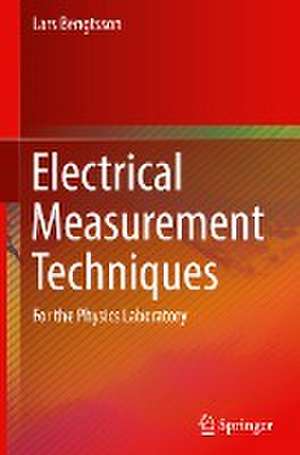Electrical Measurement Techniques: For the Physics Laboratory
Autor Lars Bengtssonen Limba Engleză Hardback – 31 ian 2024
Preț: 804.21 lei
Preț vechi: 1044.42 lei
-23% Nou
Puncte Express: 1206
Preț estimativ în valută:
153.89€ • 161.41$ • 128.11£
153.89€ • 161.41$ • 128.11£
Carte tipărită la comandă
Livrare economică 28 martie-03 aprilie
Preluare comenzi: 021 569.72.76
Specificații
ISBN-13: 9789819981861
ISBN-10: 9819981867
Pagini: 407
Ilustrații: XVI, 407 p. 533 illus., 255 illus. in color.
Dimensiuni: 155 x 235 mm
Greutate: 0.91 kg
Ediția:1st ed. 2024
Editura: Springer Nature Singapore
Colecția Springer
Locul publicării:Singapore, Singapore
ISBN-10: 9819981867
Pagini: 407
Ilustrații: XVI, 407 p. 533 illus., 255 illus. in color.
Dimensiuni: 155 x 235 mm
Greutate: 0.91 kg
Ediția:1st ed. 2024
Editura: Springer Nature Singapore
Colecția Springer
Locul publicării:Singapore, Singapore
Cuprins
Chapter 1. Introduction.- Chapter 2. Noise: Sources and remedies.- Chapter 3. Sensors.- Chapter 4. The instrumentation amplifier.- Chapter 5. Transmission lines.- Chapter 6. Probes.- Chapter 7. Transform theory.- Chapter 8. Spectral analyzers.- Chapter 9. Analog filters.- Chapter 10. Digital filters.- Chapter 11. ADCs and sampling.- Chapter 12. Time-to-digital converters.- Chapter 13. Statistics.- Chapter 14. Uncertainty budgets.- Chapter 15. The lock-in amplifier.- Chapter 16 Correlation.- Chapter 17. Curve fitting.- Chapter 18. Introduction to control theory.- Appendix.- A Operational amplifiers.- Index.
Notă biografică
Dr. Lars Bengtsson is an associate professor in Physics at the University of Gothenburg and has specialized in electrical measurement system and embedded measurement system. He is teaching embedded systems and electrical engineering at both University of Gothenburg and Chalmers University of Technology. He has published several scientific papers on electrical measurement techniques and on pedagogical aspects on teaching in higher education in the STEM subjects. His research is mainly focused on customizing electrical measurement systems for physics laboratories (atomic and nuclear instrumentation).
Textul de pe ultima copertă
This book highlights the electrical engineering aspects of a typical physics laboratory. To perform a sound experiment in a physics laboratory, it is paramount that readers understand the equipment and methods used to collect the data. This includes sensors (e.g., thermocouples and vacuum gauges), amplifiers (e.g., instrumentation amplifiers and lock-in amplifiers), oscilloscopes and probes (active probes and current probes), transmission cables (50-ohm termination) and noise shielding (grounding), spectrum analyzers (FFT and heterodyne technique), ADCs and digital signal processing, convolution and correlation, data analysis such as curve fitting, and uncertainty calculations (uncertainty ‘budgets’). The readers need to know about electromagnetic crosstalk, time-to-digital converters, student-t distributions, PID controllers, spectral leakage, and windows. This book helps readers understand all of that.
Caracteristici
Highlights the electrical engineering aspects required for a physics laboratory
Covers sensor technology, amplifiers and filters, instruments and probes, transmission cables and noise shielding
Is intended for students working in a physics/chemistry laboratory to learn electrical engineering
Covers sensor technology, amplifiers and filters, instruments and probes, transmission cables and noise shielding
Is intended for students working in a physics/chemistry laboratory to learn electrical engineering
